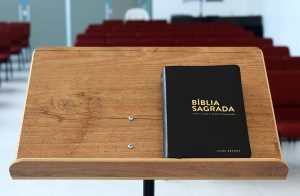- He Hath No Form, Nor Comelines, Nor Beauty – Psa 8:5 speaks of the incarnation of the Lord Jesus who is crowned with Glory and Honor. The Lord Jesus Christ is also described as, the “Lily of the Valleys”, the “Rose of Sharon” (Song of Solomon 2:1), and the “Bright and Morning Star” (Rev 22:16). We thrill to hear of these magnificent descriptions of the Lord Jesus, yet Isa 53:2 and Isa 52:14 speaks of the promised Messiah as having “no form”, “no comeliness” and “no beauty”. The Hebrew word for “form” (toar 8389) is translated a number of different ways in English and conveys the idea of beautiful, goodly, comely and countenance. And the Hebrew word for “comeliness” (hadar), is pregnant with meanings that are expressed by a number of English words, such as beauty, honor, and majesty, among others. Thus, the statement “he hath no form” emphasizes the opposite of “beauty”, the fact of His having become sin for His people. The chief characteristic of the offerings that God had prescribed in the Old Testament is perfection: “Ye shall not offer unto the LORD that which is bruised, or crushed, or broken, or cut” (Lev 22:24). Of course, all of those Old Testament sacrifice offerings pointed to the Messiah Who embodied perfection – signifying His absolute sinlessness – yet He had to become sin, or spiritually corrupted, for all whom He came to save. Though He was crowned with Glory and Majesty, we must never lose sight of the astounding fact that the Messiah had to become their very opposite – repulsive, shameful, and degraded – in order to redeem each believer from sin and its punishment of everlasting Hell and make His bride glorious. Being “Lily of the Valleys”, the “Rose of Sharon”, and the “Bright and Morning Star”, had to become what you and I are by nature – vile, loathsome and abominable.
Isa 53:2 “For he shall grow up before him as a tender plant, and as a root out of a dry ground: he [speaking of Lord Jesus] hath no form nor comeliness; and when we shall see him, there is no beauty that we should desire him.”
Isa 52:14 “As many were astonied at thee; his [speaking of Lord Jesus] visage was so marred more than any man, and his form, more than the sons of men.”
2 Cor 5:21 “For he [God the Father] hath made him [God the Son] to be sin for us, who knew no sin; that we might be made the righteousness of God in him.”
Heb 2:9 (quoting Psa 8:5) “But we see Jesus, who was made a little lower than the angels for the suffering of death, crowned with glory and honour; that he by the grace of God should taste death for every man.”
1 Pet 1:19 “Forasmuch as ye know that ye were not redeemed with corruptible things, as silver and gold, from your vain conversation received by tradition from your fathers; 19But with the precious blood of Christ, as of a lamb without blemish and without spot:”
Eph 5:25-27 “Husbands, love your wives, even as Christ also loved the church, and gave himself for it; 26That he might sanctify and cleanse it with the washing of water by the word, 27That he might present it to himself a glorious church, not having spot, or wrinkle, or any such thing; but that it should be holy and without blemish.”
- Despised and Rejected of Men – Psa 22:6 says, “But I [Speaking of Lord Jesus] am a worm, and no man; a reproach of men, and despised of the people”. Man despises God and John 3:19 explains why this is so: “And this is the condemnation, that light is come into the world, and men loved darkness rather than light, because their deeds were evil”. Just as man rejects God’s Written Word, the Bible, so man rejected the Incarnate Word, Jesus Christ, when He walked upon this earth. Luke 10:16 also illustrates this sad reality that man’s hatred for his fellowman is indicative of how much he actually despises God: “He that heareth you heareth me; and he that despiseth you despiseth me; and he that despiseth me despiseth him that sent me”. Also, the idea of “hiding from God”: “We hid as it were our faces from him”, stems from our sinfulness – love for darkness, as Gen 3:8 indicates, “… Adam and his wife hid themselves from the presence of the LORD God amongst the trees of the garden”. And Num 15:31 declares the punishment for despising the Word of God: “Because he hath despised the word of the LORD, and hath broken his commandment, that soul shall utterly be cut off; his iniquity shall be upon him”. Furthermore, since this is the lot of all mankind, who are conceived in sin and born in iniquity according to Psa 51:5 – they will be cut off. To be “cut off” is language that speaks of being cast into Hell – the penalty we all deserve. That is also why Christ, Who was laden with the iniquity of His people, had to be cut off. In other words, He had to endure the eternal wrath of God for those He came to save. Messiah took upon Himself as He became sin and fulfilled God’s Law – eternal damnation in Hell.
Isa 29:15 “Woe unto them that seek deep to hide their counsel from the LORD, and their works are in the dark, and they say, Who seeth us? and who knoweth us?”
Isa 53:3 “He is despised and rejected of men; a man of sorrows, and acquainted with grief: and we hid as it were our faces from him; he was despised, and we esteemed him not.”
Psa 88:4 “I [speaking of Lord Jesus] am counted [esteemed] with them that go down into the pit [hell]: I am as a man that hath no strength:”
John 19:15 “But they cried out, Away with him, away with him, crucify him. Pilate saith unto them, Shall I crucify your King? The chief priests answered, We have no king but Caesar.”
Luke 20:17 “And he beheld them, and said, What is this then that is written, The stone which the builders rejected, the same is become the head of the corner?”
Psa 118:22-23 “The stone which the builders refused is become the head stone of the corner. 23This is the LORD’s doing; it is marvellous in our eyes.”
- Stricken, Smitten of God, Afflicted – Isa 53:3-4 depicts both the rejection of Christ by man and ultimately the eternal abandonment by God His Father. The pain and sorrow that the Lord Jesus had to overcome is staggering, and beyond our finite understanding. The word “sorrow” (makob 4341) appears in Messianic Psalm 38, pictures the rigors of Hell that Christ had to endure, bearing the sins of his elect, as verses 3 through 7 set forth. Psalm 22, which is also a Messianic Psalm gives many details of the unimaginable spiritual agony that the Lord Jesus had to endure as He became sin for His bride, the eternal Church. The Hebrew word used for “stricken” (naga 5060) and is rendered as – “touch”, “plagued”, and “draweth nigh”: “For my soul is full of troubles: and my life draweth nigh [stricken] unto the grave” (Psa 88:7). Time after time in these verses, and throughout Isaiah 53 and the Bible, God goes into great detail so that we will not miss the tremendous truth that His Son became sin nor forget the terrible price that His Son had to pay – to suffer the equivalent of eternity in Hell, in order to “save His people from their sins”, as 2 Cor 5:21, emphasizes: “For he [God the Father] hath made him [God the Son] to be sin for us, who knew no sin; that we might be made the righteousness of God in him”. The Hebrew word for “smitten” (nakah 5221) is translated as various forms of “smite”, “slay”, and “kill”. Notice how the phrase says, “smitten of God”. Who can begin to comprehend this amazing declaration that God the Father would “kill” God the Son with the spiritual “second death” – eternal damnation of both body and soul in Hell – in accordance with the Law of God, the Bible? That is the identical punishment that you and I deserve for our sins. A very significant passage is Zec 13:7, which foretells the account of all the Disciples who forsook the Lord when He allowed Himself to be voluntarily captured in the Garden of Gethsemane (wine press): “I [God] will smite the shepherd, and the sheep of the flock shall be scattered abroad”. The Lord Jesus, who had became sin, was crushed in the winepress of God to shed His blood (or life) in order to make atonement, or payment, for the sins of His children as we read in Isa 63:3, “I [Jesus] have trodden the winepress alone; and of the people there was none with me”. Psa 22:1 illustrates the unspeakable agony of the Only One (so far) Who has experienced the very essence of Hell: “My God, my God, why hast thou forsaken me? why art thou so far from helping me, and from the words of my roaring?”. Psa 88:7 continues to pinpoint the very essence of Hell: “Thy wrath lieth hard upon me, and thou hast afflicted me with all thy waves. Selah”. Jonah 2:2-6 gives us another picture of Christ in Hell. Keep in mind that Jonah in whale’s belly is a type, or figure, of the Lord Jesus Christ in that Christ was in the heart of earth when He suffered the wrath of God: “For as Jonas was three days and three nights in the whale’s belly; so shall the Son of man be three days and three nights in the heart of the earth [under the wrath of God]” (Matt 12:40). The anguish that epitomizes the essence of Hell is expressed in the Savior’s cry from the Cross in Mark 15:34: “And at the ninth hour Jesus cried with a loud voice, saying, Eloi, Eloi, lama sabachthani? which is, being interpreted, My God, my God, why hast thou forsaken me?”. Christ was able to endure Hell knowing that His body would not be subject to “corruption” (Acts 13:33-37), or decay as we read in Jonah 2:6, “I went down to the bottoms of the mountains; the earth with her bars was about me for ever: yet hast thou brought up my life from corruption, O LORD my God”.
Isa 53:3-4, 7 “He is despised and rejected of men; a man of sorrows, and acquainted with grief: and we hid as it were our faces from him; he was despised, and we esteemed him not. 4Surely he hath borne our griefs, and carried our sorrows: yet we did esteem him stricken, smitten of God, and afflicted. 7He was oppressed, and he was afflicted, yet he opened not his mouth: he is brought as a lamb to the slaughter, and as a sheep before her shearers is dumb, so he openeth not his mouth.”
Psa 38:3-7 “There is no soundness in my [speaking of Lord Jesus] flesh because of thine [God’s] anger; neither is there any rest in my bones because of my sin [laden with our sin]. For mine iniquities are gone over mine head: as an heavy burden they are too heavy for me. My wounds stink and are corrupt because of my foolishness. I am troubled; I am bowed down greatly; I go mourning all the day long. For my loins are filled with a loathsome disease: and there is no soundness in my flesh.”
Zec 13:7 “Awake, O sword, against my shepherd, and against the man that is my fellow, saith the LORD of hosts: smite the shepherd, and the sheep shall be scattered: and I will turn mine hand upon the little ones.”
Matt 26:31 “Then saith Jesus unto them, All ye shall be offended because of me this night: for it is written [in Zec 13:7], I will smite the shepherd, and the sheep of the flock shall be scattered abroad.”
Isa 63:1-3 “Who is this that cometh from Edom, with dyed garments from Bozrah? this that is glorious in his apparel, travelling in the greatness of his strength? I that speak in righteousness, mighty to save. Wherefore art thou red in thine apparel, and thy garments like him that treadeth in the winefat? I have trodden the winepress alone; and of the people there was none with me: for I will tread them in mine anger, and trample them in my fury; and their blood shall be sprinkled upon my garments, and I will stain all my raiment.”
Jon 2:2-6 “And said, I [Jonah typifying Christ] cried by reason of mine affliction unto the LORD, and he heard me; out of the belly of hell cried I, and thou heardest my voice. For thou hadst cast me into the deep, in the midst of the seas; and the floods compassed me about: all thy billows and thy waves passed over me. Then I said, I am cast out of thy sight; yet I will look again toward thy holy temple. The waters compassed me about, even to the soul: the depth closed me round about, the weeds were wrapped about my head. I went down to the bottoms of the mountains; the earth with her bars was about me for ever: yet hast thou brought up my life from corruption, O LORD my God.






















